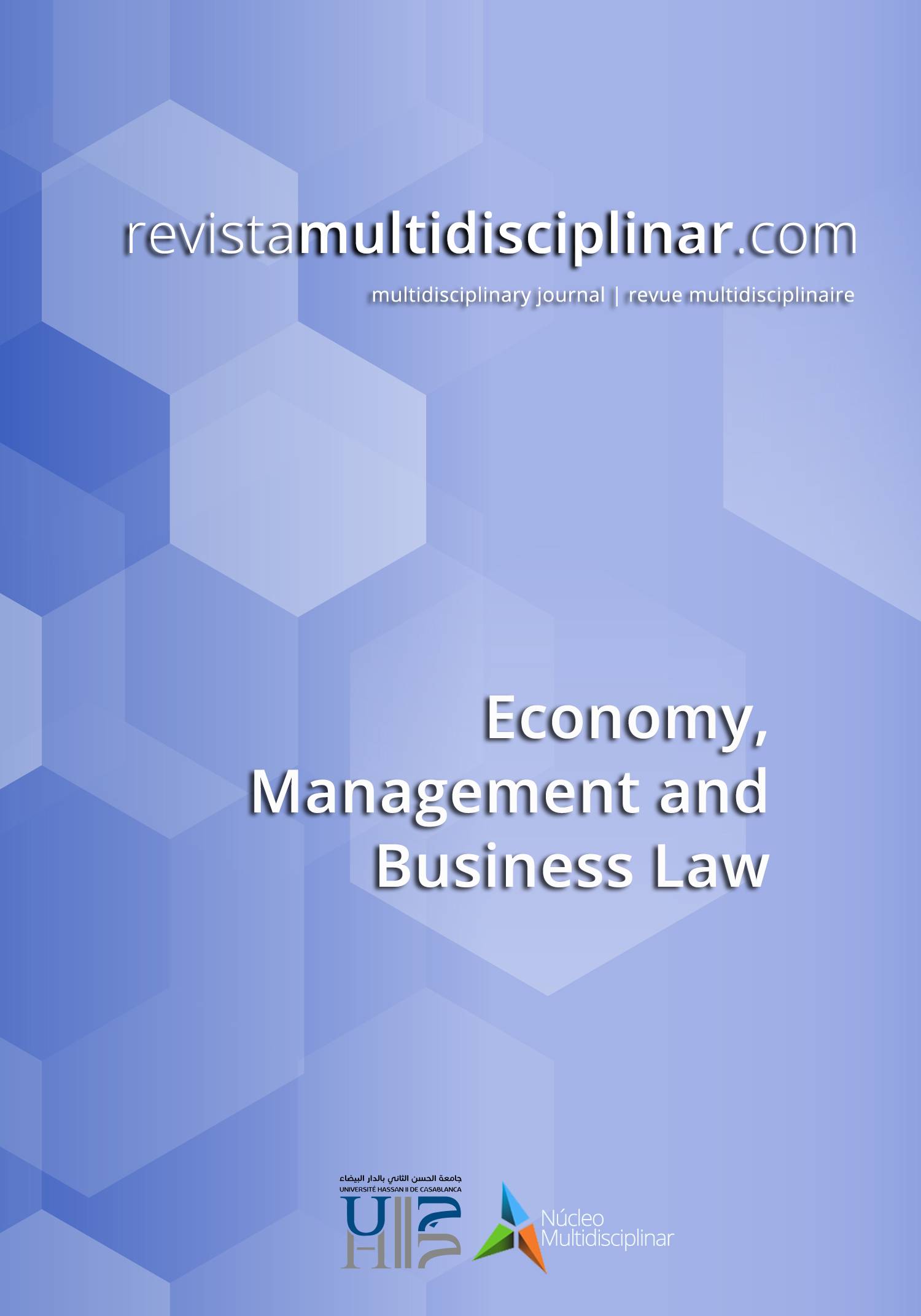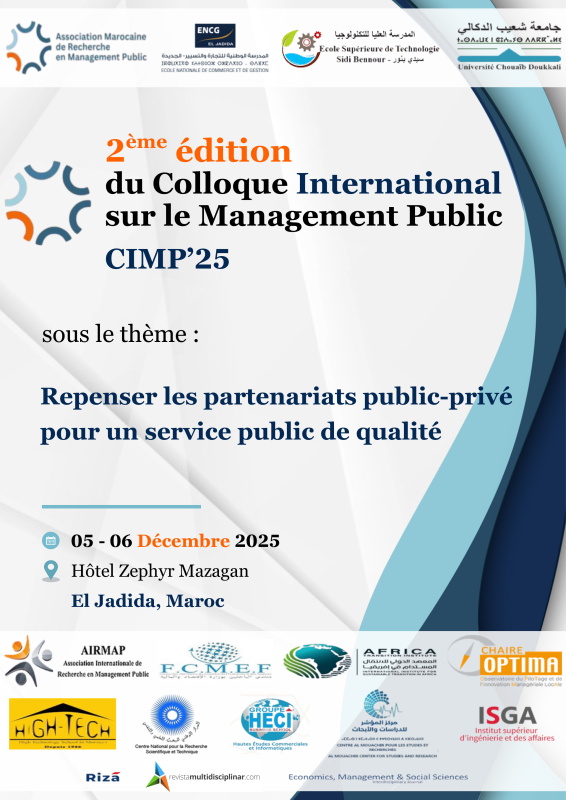O panorama empresarial de Marrocos
e o ecossistema de financiamento do impacto social durante a pandemia de COVID-19
DOI:
https://doi.org/10.23882/rmd.24183Palavras-chave:
Social, Financiamento, Ecossistema, cooperativas, ImpactosResumo
Muitas iniciativas empresariais e outras iniciativas coletivas criam impacto social para além dos ganhos económicos. Neste documento, discutiremos essas iniciativas com foco no ecossistema de financiamento que é crucial para essas organizações. Começamos por discutir a economia social e solidária antes de falarmos do empreendedorismo e das empresas sociais. De seguida, focamos as cooperativas, que são muito importantes no nosso contexto pelo impacto que contribuem para alcançar.
O tema da economia social e solidária (ESS) em Marrocos é objeto de grande atenção nos meios económicos, políticos e académicos. Dada a singularidade do contexto marroquino, os avanços regionais, a dinâmica demográfica e as características económicas, acentuam-se as questões sociais consideráveis e amplifica-se a importância das entidades da ESS, especialmente no que diz respeito ao seu público-alvo. O panorama da ESS, que inclui um conjunto diversificado de organizações, tem vindo a adaptar-se e a expandir-se continuamente desde a independência do país para responder às características distintas do seu ambiente.
Este artigo é o resultado de uma presença prolongada no nosso campo de investigação. Recolhemos dados qualitativos após várias entrevistas que comparámos com os dados oficiais apresentados no documento. Neste artigo, fizemos um inventário das principais características do sector da ESS antes de discutirmos as medidas tomadas na sequência da pandemia de covid-19. Por fim, destacamos a necessidade de financiar as cooperativas e de incentivar a digitalização dos seus modelos de negócio.
Referências
Austin, J., Gutierrez, R., Ogliastri, E., & Reficco, R. (2006) Effective Management of Social Enterprises. Cambridge, MA: David Rockefeller Center Series on Latin American Studies, Harvard University.
Baker, T., & Nelson, R. E. (2005). Creating something from Nothing: Resource Construction through Entrepreneurial Bricolage. Administrative Science Quarterly, 50(3), 329-366
Bellihi, H., & Bazi, M. (2013). Entrepreneuriat social : une nouvelle vision. Journal of Business and Economics, 1(1), 1-10.
Boncler, J. (2002). L’économie solidaire : une nouvelle forme d’entrepreneuriat. Actes du deuxième congrès de l'Académie de l'Entrepreneuriat, Bordeaux (Novembre 2002), 77-95.
Burkett, I. (2010). Financing social enterprise understanding needs and realities. Foresters Community Finance.
Cassar, G. (2004). The financing of business start-ups. Journal of Business Venturing, 19(2), 261-283. 2(4), 399-412.
Centre Mohammed VI de soutien à la microfinance solidaire (2018).Tendances su secteur de la microfinance. Publications du centre – Sept 2018.
Centre Mohammed VI de soutien à la microfinance solidaire (2020). « Tableau de bord mensuel de la microfinance au Maroc ». Publications du centre - Feb 2020.
Conseil Economique, Social et Environnemental du Maroc (2013). Initiative Nationale pour le Développement Humain : analyse et recommandations. Saisine nº 2 ; pp-23.
Conseil économique, social et environnemental du Maroc (2015). Economie Sociale et Solidaire : un levier pour une croissance inclusive. Auto saisines #19 (AS19-2015). 91p.
Courts of Auditors (2016). Summary of the report on the management control of the Marketing and Export Office (OCE)
Crédit Agricole du Maroc (2017). Financial communication (Activity and results). Institutional publications of the Crédit Agricole du Maroc.
Defourny, J. (2004). L'émergence du concept d'entreprise sociale. Reflets et perspectives de la vie économique, 2004/3(Tome XLIII), 9-23. https://doi.org/10.3917/rpve.433.0009
Dorado, S., & Haettich, H. (2001). Social Entrepreneurial Ventures: Worth a Careful Look? College of Management, UMASS-Boston., 2001(Working paper).
Ebben, J., & Johnson, A. (2006). Bootstrapping in small firms: An emprical analysis of change over time. Journal of Business Venturing, 21(6), 851-865.
Etude sur la dynamisation du tissu économique en milieu rural – Union européenne 2011. Rapport de la Phase I: Analyse de l’existant. contrat cadre benef 2009 EuropeAid/127054/CSER/Multi - lot nº 1 demande nº/ 2010/244840 Version 1.
European Commission (2011), Social Business Initiative: Creating a favourable climate for social enterprises, key stakeholders in the social economy and innovation, Communication from the Commission to the European Parliament, the Council, the European economic and social Committee and the Committee of the Regions.
Food and Agriculture Organization of the United Nations Rome, 2020. Covid-19: Rapid and ambitious taken by the Kingdom of Morocco.
General Secretariat of the Government (2018). Avant projet loi 15.18. (http://www.sgg.gov.ma/).
HCP, 2011. Summary Report of the National Survey of Non-Profit Institutions (FY 2007)
High Commission for Planning, United Nations and World Bank. « SOCIAL & ECONOMIC IMPACT OF THE COVID-19 CRISIS IN MOROCCO ». July 2020
Lasprogata, G., & Cotton, M. (2003). Contemplating Enterprise: The Business and Legal Challenges of Social Entrepreneurship. American Business Law Journal, 41(1), 67-113.
Layoun E., & Grojean, R. (2016). Évaluation du Programme d'appui à la phase II de l'Initiative Nationale de Développement Humain (INDH Phase II) au Maroc. LOT 9 : Culture, Éducation, Emploi et Social Demande de Services n° 2016/381245/1.
Lisetchi, M., & Brancu, L. (2014). The entrepreneurship concept as a subject of social innovation. Procedia - Social and Behavioral Sciences, 124(2014), 87-92.
Mair, J., & Marti, I. (2006). Social Entrepreneurship Research: A Source of Explanation, Prediction, and Delight. Journal of World Business, 41(1), 36-44.
Martin, M. (2013). Status of the Social Impact Investing Market: A Primer; Prepared for the UK Cabinet Office.
Martin, R. L., & Osberg, S. (2007). Social Entrepreneurship: The Case for Definition. Stanford Social Innovation review., 2007(Spring), 28-39.
Mavra, L. (2011). Growing social enterprise: research into social replication, Social Enterprise Coalition.
Ministère de l’économie et des finances – Direction des études et des prévisions financières. (2018), Note de conjoncture N° 258. 38p.
Ministère de l’intérieur, Coordination Nationale de l’INDH. (2018). Initiative nationale pour le développement humain genèse et évolution.
Ministère de l’intérieur, L’Initiative Nationale pour le Développement Humain en chiffres. Réalisations 2005-2017.
Ministère de l’intérieur, Manuel de procédures des activités génératrices de revenu (AGR) – Initiative nationale pour le développement humain, 2011-2015.
Ministère délégué auprès du chef du gouvernement chargé des affaires économiques et générales. (2011). Stratégie Nationale de l’économie sociale et solidaire 2010 – 2020.
Mohammed v foundation for solidarity, 2019. Activity report - ready to help the needy.
Moore, M-L., Westley, F. R., & Nicholls, A. (2012). “The Social Finance and Social Innovation Nexus“, Journal of Social Entrepreneurship, 115-132
Neeley, L., & Van Auken, H. (2009). The relationship between owner characteristics and use of bootstrap financing methods. Journal of Small Business and Entrepreneurship, 2
Observatoire National du Développement Humain. 2013. Évaluation des réalisations de la première phase de l’INDH (2005-2010) et leurs effets sur les populations cibles. 2013MO1772.
OCDE (2009), Proposition d’adhésion du Maroc à la Déclaration de l’OCDE sur l’investissement international et les entreprises multinationales, DAF/INV/WP (2009)2, 6 octobre.).
OCDE (2011), Compétitivité et développement du secteur privé : Maroc 2010 : stratégie de développement du climat des affaires.
OCDE (2018). Examen des statistiques d'investissements directs internationaux au Maroc. Programme pays Maroc
OECD. (2014). Enhancing the contribution of social business to sustainable development co-operation report 2014: Mobilising resources for sustainable development. OECD: OECD Publishing
ONDH ("Evaluation of achievements of the first phase of the INDH (2005-2010) and their effects on target populations," 2013)
Organisation Internationale du Travail (2007). L’économie informelle : permettre une transition vers la formalisation- Colloque interrégional tripartite sur l’économie informelle : Permettre une transition vers la formalistion- Document de travail N° ISIE/2007/1
Organization for Economic Co-operation and Development (OECD). (2003). Entrepreneurship and local Economic development – program and policy recommendations. Paris- France.
Peter Sunley & Steven Pinch, (2012) "Financing social enterprise: social bricolage or evolutionary entrepreneurialism?", Social Enterprise Journal, 8(2),108-122
Rapport du Conseil Economique, Social et Environnemental. 2013. Initiative Nationale pour le Développement Humain : analyse et recommandations. Saisine nº 2 ; pp-23.
Report of the Economic, Social and Environmental Council, National Initiative for Human Development: analysis and recommendations, Referral n ° 2/2013
Short, J., Moss, T., & Lumpkin, G. (2009). “Research in Social Entrepreneurship: Past Contributions and Future Opportunities”, Strategic Entrepreneurship Journal, 3, 161-194.
Sibieude, T. (2011). Conférence sur : 10 Idées reçues sur l’entrepreneuriat social. Disponible Dans http://www.youtube.com/watch?v=VZSy7JF76pk (retrieved le 10/01/2015) (March.).
Social Enterprise UK (2011) Fightback Britain: A Report on the State of Social Enterprise Survey 2011. London: Social Enterprise UK.
The China Development Institute (CDI), Z/Yen. (2018), The Global Financial Centres Index 23. Financial centre futures. 46p.
The Universal Standards for Social Performance Management by the Social Performance Task Force: http://sptf.info/spmstandards/universal-standards
United Nations Development Programme (UNDP), 2020. Human Development Report 2020 The Next Frontier: Human Development and the Anthropocene. Human Development Report 2020.
Zahra, S. A., Gedajlovic, E., Neubaum, D. O., & Shulman, J. M. (2009), “A typology of social entrepreneurs: Motives, search processes and ethical challenges”, Journal of Business Venturing, 24(5), 519-532.
Downloads
Publicado
Como Citar
Edição
Secção
Licença
Direitos de Autor (c) 2023 Mohamed Bazi, Mabrouk Sanaa

Este trabalho encontra-se publicado com a Creative Commons Atribuição-NãoComercial 4.0.







